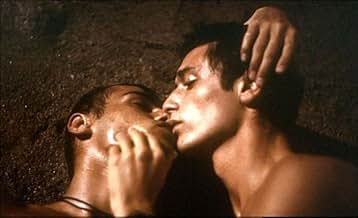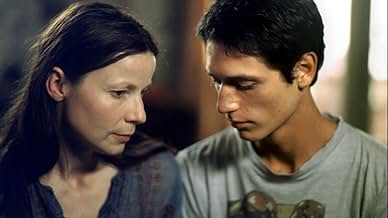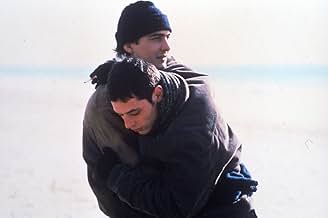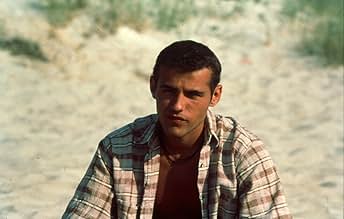Presque rien
Mathieu, 18, spends the summer at his mother's summer house, in Brittany. On the beach, he meets Cédric, a boy his age. A love-story begins between the two boys.Mathieu, 18, spends the summer at his mother's summer house, in Brittany. On the beach, he meets Cédric, a boy his age. A love-story begins between the two boys.Mathieu, 18, spends the summer at his mother's summer house, in Brittany. On the beach, he meets Cédric, a boy his age. A love-story begins between the two boys.
- Awards
- 1 nomination total
- Mathieu
- (as Jeremie Elkaïm)
- Cédric
- (as Stephane Rideau)
- La psychiatre
- (as Rejane Kerdaffrec)
Featured reviews
Mathieu (handsome and gifted Jérémie Elkaïm) is visiting the seaside for a holiday, a time to allow his mother (Dominique Reymond) to struggle with her undefined illness, cared for by the worldly and wise Annick (Marie Matheron) and accompanied by his sister Sarah (Laetitia Legrix): their distant father has remained at home for business reasons. Weaving in and out of the first moments of the film are images of Mathieu alone, looking depressed, riding trains, speaking to someone in a little recorder. We are left to wonder whether the unfolding action is all memory or contemporary action.
While sunning at the beach Mathieu notices a handsome youth his age starring at him, and we can feel Mathieu's emotions quivering with confusion. The youth Cédric (Stéphane Rideau) follows Mathieu and his sister home, continuing the mystery of attraction. Soon Cédric approaches Mathieu and a gentle introduction leads to a kiss that begins a passionate love obsession. Mathieu is terrified of the direction he is taking, rebuffs Cédric's public approaches, but continues to seek him out for consignations. The two young men are fully in the throes of being in love and the enactment of the physical aspect of this relationship, so very necessary to understanding this story, is shared with the audience in some very erotic and sensual scenes. Yet as the summer wears on Mathieu, a committed student, realizes that Cédric is a drifter working in a condiment stand at a carnival. It becomes apparent that Cédric is the Dionysian partner while Mathieu is the Apollonian one: in a telling time in architectural ruin Mathieu is excited by the beauty of the history and space while Cédric is only interested in the place as a new hideaway for lovemaking.
Mathieu is a complex person, coping with his familial ties strained by critical illness and a non-present father, a fear of his burgeoning sexuality, and his nascent passion for Cédric. Their moments of joy are disrupted by Cédric's admission of infidelity and Mathieu's inability to cope with that issue and eventually they part ways. Time passes, family changes are made, and Mathieu drifts into depression including a suicide attempt. The manner in which Mathieu copes with all of these challenges and finds solace, strangely enough, in one of Cédric's past lovers Pierre (Nils Ohlund) brings the film to an ambiguous yet wholly successful climax.
After viewing the film the feeling of identification with these characters is so strong that the desire to start the film from the beginning now with the knowledge of the complete story is powerful. Lifshitz has given us a film of meditation with passion, conflicts with passion's powers found in love, and a quiet film of silences and reveries that are incomparably beautiful. The entire cast is superb and the direction is gentle and provocative. Lifshitz is most assuredly one of the bright lights of film-making. In French with English subtitles. Highly Recommended. Grady Harp
If you haven't seen the film, perhaps you would like to stop reading.
Sebastien Lifshitz, the director of the film, has told his story from Mathieu's viewpoint. Most viewers appear to be disoriented by the different times within the film, but there are hints that are not obvious, as one can see, in retrospect. The story is told in flashbacks that might add to the way some people will view the film. This is a story about the doomed the love Mathieu felt for Cedric and the ultimate breakdown of their life together.
First of all, Cedric, the handsome young local, pursues Mathieu until he succeeds in convincing him he likes him. Mathieu feels the attraction for Cedric too. We realize how different both young men are by the way Cedric tells Mathieu's family how he feels school is not for him. On the other hand, Mathieu, who wants to be an architect, finds beauty in the abandoned place where Cedric has taken him. We watch as Mathieu, reading from the guide book, wants Cedric's attention.
When Mathieu comes out to his mother, she wisely tells him about the importance of continuing his career. She also points out about what future both of them would have together, which proves to be true. Mathieu appears to have learned his lesson, the hard way. He goes on to an uncertain life with Cedric and attempts to take his own life. We watch him in the hospital speaking to a psychiatrist that has treated his wounded soul.
The ending might be confusing for most viewers, but there is a moment in the film when Mathieu goes to work in a bar where we see him washing glasses and looking intently to Pierre, the young man who frequents the bar. That is why when Mathieu goes looking for Pierre at his house, appears to be hard to imagine. Yet, we have seen the way Mathieu is obviously interested in Pierre. The last scene at the beach, when Pierre and Mathieu are seen strolling in the sand, has a hopeful sign that things will be better between them as they watch a young boy, apparently lost, but then realizing the father is nearby.
Jeremie Elkaim makes Mathieu one of the most complex characters in recent films. This is a young man who is hard to understand on a simple level. Mathieu has suffered a lot, first with the separation of his parents, then with his depressed mother and with losing Cedric. Stephan Rideau, who has been seen on other important French films, is equally good, as the shallow Cedric.
While "Come Undone" will divide opinions, the film deserves a viewing because of the complexity and the care Sebastien Lifshitz gives to the story.
In every way, the director pulls you into the lives of the characters - which is why so many people feel so strongly that the movie disappointed them. After I finished watching it, I felt the same. But upon some reflection, I recognized that this is how the movie had to be: the 'story' isn't the narrative, it's the emotions you (the viewer) feel.
The lighting, scenery, and camera angles immerse you in the scenes - they're rich, exquisite, and alive with detail and nuance. Although I normally cannot countenance films without a fully developed plot (after all, isn't a movie 'supposed' to tell a story), this film is definitely one of my new favorites.
(USA: Come Undone /UK: Almost Nothing)
Aspect ratio: 1.85:1
Sound format: Dolby Digital
While visiting his sick mother in Brittany during summer recess, a teenage boy (Jérémie Elkaïm) falls in love with a local youth (Stéphane Rideau), but their relationship falters as Elkaïm is cut adrift from all that was once familiar to him, with near-tragic consequences.
Sébastien Lifshitz's intimate drama chronicles the sexual awakening of a naive teenager over the course of an idyllic summer, recounted in piecemeal fashion as the director cuts abruptly between timeframes, from Elkaïm and Rideau's love affair to the former's subsequent hospitalization following an off-screen suicide attempt, rendered 'naturalistic' by hand-held camera-work and some improvized dialogue exchanges in key scenes. The results are confusing, to say the least: Just as the boys begin to strike out from their families and forge a life for themselves, Elkaïm slips into depression (why?) and appears to reject Rideau (why?), after which he goes looking for him again, only to find solace in unexpected quarters.
Anyone hoping for a rose-tinted love story will come away feeling more than a little disappointed, though Lifshitz refuses to compromise the sexual aspects of his own screenplay (co-written with Stéphane Bouqet): Elkaïm and Rideau are completely nude in several sequences, and there's a memorable, full-on sex session amongst the sand dunes which should satisfy all but the most ardent porn-watcher. But the boys' attachment is complicated by their relationship with their respective families, especially Elkaïm, who feels unable to declare his burgeoning sexuality because of a recent tragedy which has driven his father away and confined his mother to her sick-bed. Sad, complex and not a little frustrating, the movie works its magic in quiet ways, but it's a little too cold and dispassionate to satisfy all tastes.
Nicely produced on a modest budget, the film also stars Dominique Reymond, Marie Matheron and Laetitia Legrix as the three women in Elkaïm's life (mother, aunt and sister, respectively), along with Nils Ohlund as one of Rideau's former boyfriends, who figures heavily in the narrative's closing stages. The two leads are fine in difficult roles, and both have become iconic figures in European gay cinema: Rideau starred in such well-regarded Queer movies as WILD REEDS (1994), FULL SPEED (1996), TRANSFIXED (1997), SITCOM (1998) and THREE DANCING SLAVES (2003), while Elkaïm - who looks like a Bel Ami porn beauty - also appears in the gay-themed drama YOU'LL GET OVER IT (2002) as the love object of handsome Julien Baumgartner (SEXY BOYS). Director Lifshitz made his feature debut with the French TV production LES TERRES FROIDES (1999) following a series of short films with Queer themes, and his latest entry is WILD SIDE (2004), another perceptive exploration of omnisexual angst.
(French dialogue)
Did you know
- TriviaJérémie Elkaïm was 21 years old and Stéphane Rideau was 23 years old when they played the teenagers 'Mathieu' and 'Cédric'. Elkaïm would later play yet another gay teenage character in the series 'À cause d'un garçon (2002)' and Rideau would play the aging hustler 'Vassili' in 'Notre paradis (2011)'.
- Quotes
Cédric: [at the beach] Hey, Mathieu.
Mathieu: Please go away.
Cédric: Why?
Mathieu: So they don't see us together.
Cédric: Are you ashamed or what?
Mathieu: No, I just don't want any trouble.
Cédric: What trouble?
Mathieu: Can't you just leave?
Cédric: You think I'm stupid?
Mathieu: Just fuck off!
Cédric: What, fuck off?
- SoundtracksWise Mans Blues
Written by Perry Blake and Glenn Garrett
Performed by Perry Blake
From Perry Blake's album "Still Life"
Courtesy of Sony - ATV Music Publishing France
- How long is Come Undone?Powered by Alexa
Details
Box office
- Gross US & Canada
- $326,484
- Gross worldwide
- $326,484
- Runtime
- 1h 40m(100 min)
- Color
- Sound mix
- Aspect ratio
- 1.85 : 1























